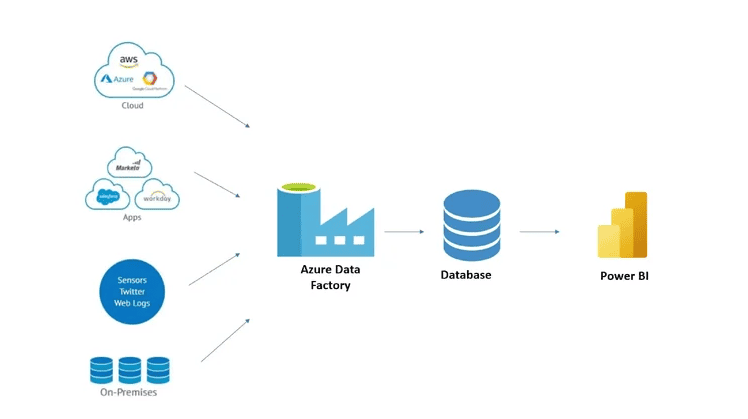Enterprise Data Architecture
Build a secure, scalable data foundation that grows with your business
Create a Unified Data Ecosystem
In today's data-driven world, organizations need robust, scalable data architectures that can accommodate growing volumes of information while ensuring security, accessibility, and performance. Northern Analytics designs and implements enterprise data solutions that serve as the foundation for your organization's analytics capabilities.
We bring together disparate data sources, implement industry best practices, and create architectures that evolve with your business needs. Our approach emphasizes both technical excellence and practical business value, ensuring your data infrastructure supports current requirements while preparing for future growth.
Key Benefits
- Consolidate data from multiple sources into a unified system
- Implement robust data governance and security controls
- Create scalable solutions that grow with your organization
- Seamless integration with Microsoft 365 and Power BI
- Improved data quality and consistency across systems

Our Enterprise Data Architecture Services
Data Warehouse Implementation
Design and build comprehensive data warehouses that consolidate information from multiple systems into a unified, optimized structure. Our solutions include dimensional modeling, fact and dimension tables, and performance-optimized query paths.
ETL Process Development
Create robust Extract, Transform, Load (ETL) processes that reliably move data between systems while applying business rules, data cleansing, and quality controls. We build automated pipelines that ensure your data is always current and accurate.
Data Governance Frameworks
Establish comprehensive data governance programs that define roles, responsibilities, and processes for managing data as a strategic asset. Our frameworks include data quality metrics, metadata management, and security controls.
Enterprise Data Security
Implement multi-layered security strategies that protect sensitive information throughout its lifecycle. Our solutions include encryption, access controls, audit trails, and compliance with industry-specific regulations like GDPR, HIPAA, and SOC 2.
Cloud Data Solutions
Design and implement cloud-based data architectures using Azure Data Factory, Synapse Analytics, and other leading platforms. We help organizations modernize their data infrastructure while maximizing flexibility and cost-efficiency.
Master Data Management
Develop strategies and systems for managing critical business data entities like customers, products, and accounts. Our MDM solutions establish trusted, consistent information across your enterprise for improved decision-making.
Success Story
Enterprise Data Warehouse
Manufacturing Industry Leader
The Challenge
A manufacturing company with multiple business units was struggling with siloed data across 12 different systems. Executives couldn't see a unified view of operations, reports were inconsistent between departments, and data quality issues were leading to questionable business decisions.
Our Solution
We designed and implemented a comprehensive data architecture solution that included:
- Enterprise data warehouse with dimensional model design
- Automated ETL processes for all source systems
- Data quality monitoring and reconciliation framework
- Master data management for key business entities
- Power BI semantic layer for consistent reporting
The Results
- Unified reporting across all business units
- 95% reduction in data reconciliation efforts
- 60% faster time-to-insight for business teams
- Improved data integrity with automated validation rules

Frequently Asked Questions
How does Northern Analytics approach enterprise data architecture?
Our approach to enterprise data architecture focuses on building secure, scalable foundations that grow with your business. We begin with a thorough assessment of your current data environment and business objectives. Then we design comprehensive data systems that integrate disparate sources, implement robust governance practices, and create adaptable structures for future expansion. Every solution is tailored to your specific needs while incorporating industry best practices and standards.
What's the difference between a data warehouse and a database?
A database is designed for transactional processing and day-to-day operations, optimized for rapid updates and specific queries. A data warehouse, by contrast, is an enterprise-wide system designed for analytics and reporting, consolidating data from multiple sources into a cohesive structure optimized for complex queries and analysis. Data warehouses typically include historical data and are designed with dimensional models that make analysis across business dimensions more efficient.
Do I need a data warehouse if I'm already using Power BI?
While Power BI can connect directly to various data sources, a data warehouse provides significant advantages for organizations with complex data needs. A proper data warehouse delivers consistent data definitions, optimized performance for complex analytics, historical data tracking, and a centralized "single version of truth." It also reduces strain on operational systems and creates a data foundation that can support multiple business intelligence tools, not just Power BI.
How long does it take to implement an enterprise data architecture solution?
Implementation timelines vary significantly based on scope, complexity, and organizational readiness. Basic data warehouse implementations can be completed in 3-6 months, while comprehensive enterprise data architectures may take 6-12 months or longer. We typically recommend an iterative approach where we deliver business value in phases, starting with high-priority data domains and expanding over time. This reduces risk and allows for adaptation as requirements evolve.
Should we use on-premises or cloud-based data architecture?
The choice between on-premises and cloud solutions depends on several factors including your existing infrastructure, security requirements, budget considerations, and growth projections. Cloud solutions typically offer greater scalability, reduced maintenance overhead, and built-in disaster recovery, while on-premises solutions may provide more direct control and can address specific regulatory requirements. Many organizations opt for hybrid approaches that leverage the advantages of both models. We help clients evaluate these options and implement the solution that best fits their specific needs.
Ready to Build Your Data Foundation?
Contact us today to discuss how our enterprise data architecture solutions can transform your organization's data capabilities and drive better business outcomes.
Get Started